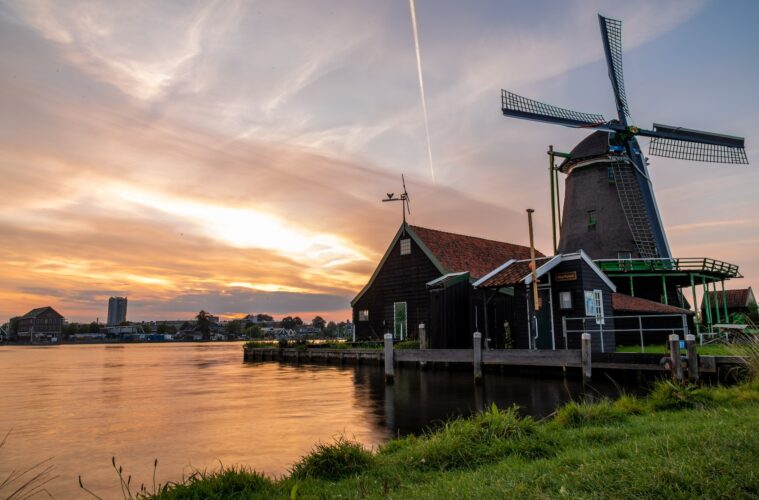In an era marked by growing environmental concerns, sustainable travel has emerged as a crucial facet of responsible tourism. The Netherlands, renowned for its picturesque landscapes, rich history, and vibrant culture, has taken a pioneering role in promoting eco-friendly travel experiences. Leveraging its penchant for innovation and commitment to sustainability, the country has crafted a unique travel narrative that seamlessly intertwines exploration with environmental consciousness. From energy-efficient transportation to sustainable lodging and immersive eco-tours, the Dutch have redefined what it means to embark on a journey that leaves minimal ecological footprints.
The Dutch Commitment to Sustainability:
At the heart of the Dutch sustainability movement lies an unwavering commitment to preserving the natural beauty and resources that make the country so enchanting. With a strong history of land reclamation and water management, the Netherlands has long understood the necessity of harmonising human endeavours with the environment. This deep-rooted respect for nature serves as the foundation for the country’s innovative strides in the realm of sustainable travel.
Efficient and Green Transportation:
One of the cornerstones of eco-friendly travel in the Netherlands is its exceptional public transportation system. The Dutch have managed to seamlessly integrate trains, buses, trams, and even ferries into a comprehensive network that provides convenient and efficient mobility across the country. High-speed trains like the NS Intercity Direct not only connect major cities but also operate on renewable energy sources, primarily wind power. The integration of sustainable transport modes significantly reduces the carbon footprint of travellers, allowing them to explore the country without contributing to pollution.
Moreover, the Netherlands has been a global frontrunner in promoting cycling as a viable mode of transportation. With its flat landscapes and extensive network of cycling paths, the country offers visitors a unique opportunity to traverse its cities and countryside on two wheels. Many cities, including Amsterdam, provide bike-sharing programs and prioritise cyclist safety through dedicated lanes and traffic management strategies.
Innovative Accommodation:
Sustainable travel goes beyond transportation, extending to the very places where travellers rest their heads. The Dutch hospitality industry has embraced innovation to create eco-friendly lodging options that blend comfort with environmental responsibility. From energy-efficient hotels to eco-hostels and even sustainable houseboats, travellers have an array of choices that align with their values.
In Amsterdam, for instance, the “Conscious Hotel” chain emphasises sustainable practices in all aspects of its operations. From sourcing local and organic products for their restaurants to utilising green building materials in their construction, these establishments offer guests a chance to support responsible tourism without sacrificing quality.
Immersive Eco-Tours:
For those seeking more immersive experiences, the Netherlands boasts an array of eco-tours that showcase its natural wonders while fostering a deeper understanding of conservation efforts. The Hoge Veluwe National Park, a sprawling expanse of heathlands, sand dunes, and woodlands, offers guided tours that shed light on the region’s biodiversity and the steps taken to preserve it. Visitors can witness the interplay between wildlife and vegetation, fostering a sense of appreciation for the delicate balance of nature.
Additionally, the Wadden Sea, a UNESCO World Heritage site, hosts guided mudflat walking tours that not only reveal the diverse marine life but also educate participants about the importance of preserving coastal ecosystems. These tours underscore the Netherlands’ dedication to environmental education and its determination to engage travellers in sustainable practices.
Culinary Sustainability:
The Dutch commitment to sustainability extends to the culinary sphere, where farm-to-table dining and ethical food practices have gained prominence. Restaurants often prioritise locally sourced ingredients, reducing the carbon footprint associated with food transportation. In recent years, urban farming initiatives have flourished, with rooftop gardens and community farms contributing to the availability of fresh produce in cities.
Future Trajectories:
The Dutch dedication to sustainable travel is an ongoing journey, with new innovations and initiatives continuously shaping the landscape. As technology advances, electric and autonomous vehicles may further transform transportation systems, and advancements in renewable energy could power an even larger portion of the country’s infrastructure. Sustainable architecture, such as energy-neutral buildings and ecologically designed urban spaces, may become more commonplace, redefining the travel experience.
Netherlands | Eco-Friendly Travel Experiences – Conclusion:
The Netherlands has emerged as a beacon of sustainability and innovation in the realm of eco-friendly travel experiences. Through efficient transportation, innovative lodging, immersive eco-tours, and culinary sustainability, the country has demonstrated that exploring new horizons need not come at the cost of the environment. As travellers seek meaningful and responsible ways to experience the world, the Dutch model serves as an inspiring testament to what can be achieved when a nation’s commitment to nature converges with its spirit of innovation.



